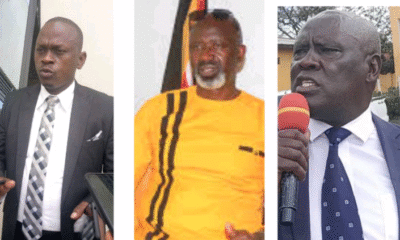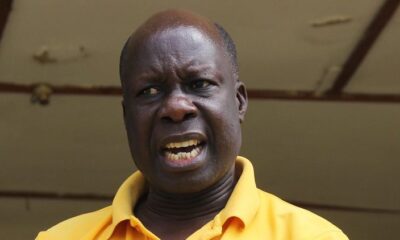







Published
23 hours agoon

By Investigative Desk | July 28, 2025
Muhangi Andrew, once a flamboyant and self-declared “youngest wealthy civil servant” in Uganda’s Ministry of Works and Transport (MoWT), has suffered a major career blow after being denied a lucrative position at the Inspectorate of Government and Uganda National Oil Company (UNOC). His rejection followed an intensive vetting process that uncovered a disturbing trail of fraud, forgery, theft scandals, and unexplained wealth.
Muhangi had applied for a Supervisor role at IGG and also later applied for Legal Officer role at UNOC which were all denied to him because they require individuals with the highest level of integrity and trustworthiness.
Reliable sources say his name was dropped at the final stage after intelligence reports flagged him for multiple irregularities including forged academic documents, alleged involvement in theft of government property, and questionable financial dealings.
“How can such a fraudster and corrupt person be employed to work with IGG office?” remarked one of the officers at IGG who declined anomity.
The FACE Technologies Scandal: A Cloud That Won’t Go Away
One of the most damning stains on Muhangi’s record is his suspected role in the disappearance of high-value computer servers belonging to FACE Technologies — the South African firm that formerly managed Uganda’s driver licensing system. These servers, which stored sensitive national data, were reportedly stolen from a Uganda Railways Corporation (URC) facility shortly after FACE’s contract with the government was terminated.
While no formal charges have yet been filed, whistleblowers inside URC and the Ministry of Works have pointed fingers at Muhangi. They claim he worked closely with rogue procurement officers and IT contractors to facilitate the disappearance of the servers — potentially for sale on the black market. Investigations into the matter are ongoing, but the scandal has made him a pariah within government circles.
A Lavish Lifestyle That Raised Eyebrows
Despite earning a modest government salary, Muhangi lived like a tycoon. He was a regular fixture at high-end Kampala nightclubs, drove luxury vehicles including a Mercedes-Benz G-Wagon and Range Rover Sport, and frequently hosted extravagant house parties at his mansion in Luzira.
But what truly raised suspicion was his recent acquisition of 75 acres of prime farmland in Kakanju, Bushenyi District — a transaction valued at a staggering UGX 800 million. The land, which previously belonged to the family of the late farming magnate Ntobotobo, has been rapidly transformed into a sprawling agri-estate. Within just three months, Muhangi reportedly poured over UGX 1 billion into developing the property.
Sources indicate that he intended to establish a farm with modern cattle ranch, large-scale goat rearing units, and an expansive banana plantation. Plans are underway to stock the estate with over 250 dairy cows, 250 beef cattle, and more than 1,000 goats — a massive investment that, according to investigators, is disproportionate to his known income.
What raised eyebrows is that the farm is restricted to the community members as it is surrounded by a high-grade chain-link fence, manned by security guards — raising further questions about what lies behind the curtain.
Ghost Deals, SACCO Loans, and Money Laundering Allegations
Investigators have established that Muhangi has been using financial proxies and third-party conduits to launder money. Insiders allege that he channels funds through local SACCOs, taking out large loans and paying them off in record time — a tactic commonly used to clean illicit funds under the guise of legitimate borrowing.
“He operates like a ghost investor,” said a source close to the inquiry. “He uses proxies to buy land and invest in agri-business. But what’s alarming is how quickly he clears large debts, sometimes within weeks — long before the repayment periods lapse.”
Under Section 3(1)(a) of Uganda’s Anti-Money Laundering Act, this conduct is considered criminal if the individual “acquires, possesses or uses property knowing, or having reason to believe, that it is the proceeds of crime.”
Fake Degrees and a Fabricated Academic Past
As part of the vetting process for IGG and UNOC jobs, investigators scrutinized Muhangi’s academic documents — only to discover that his papers were forged. Colleagues and former classmates were shocked by the revelations, as the institutions he claimed to have attended had no record of his enrollment or graduation. His transcripts were traced to a known forgery ring based in downtown Kampala.
The fallout was swift. Those who once admired his ambition and opulence began to quietly disassociate. The whispers grew louder — ghost procurements, fake fuel deliveries, and inflated contract kickbacks. A man who once presented himself as a poster child for youthful civil service success was now being exposed as a fraud held together by lies and greed.
A Future in Ruins
Now isolated and under investigation, Muhangi’s once-glamorous lifestyle is beginning to crumble. Whereas he always lied to people that he has powerful political connections in the state house, it has turned out to be a big lie as none is willing to save him from embarrassment.
What was meant to be a career leap into one of Uganda’s most sensitive ministries has instead become a cautionary tale about unchecked greed, deception, and the dangers of living a lie under the bright lights of public service.
More details regarding Muhangi’s scandals will be published by this site.


EXCLUSIVE: Muhangi Andrew Denied Gov’t Job Over Fraud, Fake Papers, and Suspicious Wealth


NRM Primaries Shake Western Uganda: Voters Reject Majority of Incumbent LCV Chairpersons


Muhangi Andrew on Tenterhooks Over Suspected Money Laundering


Fighting the People’s Choice; Kinkizi West Erupts as Powerful Forces Target MP Kaberuka!


NRM to Replace Some District Registrars Ahead of Primary Elections!


Rebecca Kadaga: A Political Relic Desperately Clinging to Relevance!
